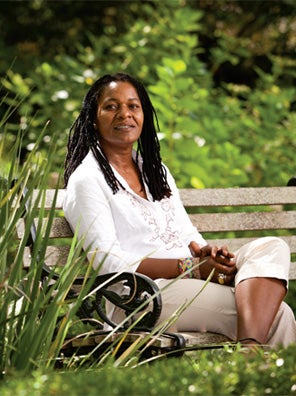She was 2,272 miles from Charleston, having left her daughter with her mom for the month and traveled by herself first to her native Georgetown, Guyana, and then to the village of Wowetta in the North Rupununi District, where her dark skin singled her out as an outsider among the indigenous Amerindian people.
Still, it was impossible for Hollis France to feel alone.
Every morning, she rose with her host family and shared the morning chores, breakfast and stories with the extended family – sons, daughters, siblings and cousins living nearby in their little cluster of homes. They talked about their day ahead and then dispersed, one by one, to fetch their buckets of well water for bathing before they went about their days – which, of course, they would replay for one another when they once again gathered together at the family compound that evening.
“As soon as I got there, I felt like I had this built-in family. You don’t have the option of going off by yourself, which makes it easy to be a good guest,” laughs France, associate professor of political science. “However, the sense of communal gathering was hard for me to get used to at first. As college professors, sometimes we live in our heads a lot. Here, in Charleston, I choose when I want to interact. There, you’re forced to interact. It’s all about contributing to and being part of that little community.”
Community, in fact, is what brought France to Wowetta for four weeks last summer. More specifically, she was there to study a community-driven model for economic development.
“These models take a holistic approach in terms of community because the social relations and environment are being considered as part of this economy,” she explains. “While the market-driven approach is individualistic, looking at how the individual benefits, this holistic approach keeps the community’s needs in mind.”
France’s case study focused on Wowetta’s cassava income-generating project, a community project that employs local women to harvest and process cassava root, extracting the cyanide from it and producing the granular cassava, called farine. Her research began in the summer of 2012, when France went on a “getting to know you” mission, working side by side with the women in the factory, which had mainly traditional equipment.
“That was very important because I was building trust,” says France, who admits that “pulling the cassava and fetching it back in the warashee [a backpack woven from native plants] was very labor intensive. But it paid off. I got the biggest compliment from the women: ‘A lot of people come in and talk to us – you’re the first to work with us.’ That meant a lot.”
This summer, she wanted to get an idea of the women’s intrinsic motivations (e.g., to give back to the community, to help support community development) and of the greater community’s perception of the project.
“The big takeaway was that – while it gave the women a sense of independence, a sense that they are contributing and relieving some of their husbands’ or partners’ financial worry – the women didn’t want this to disrupt their regular lifestyles, their work on their farms, their social lives,” says France. “And, even though the men might want their women home taking care of things, they still felt it was important to be passing along the knowledge of the process of making farine. So, there is some community buy- in in terms of recognizing the importance of cassava to the culture.”
That community-based thinking – along with things like differential pricing for people outside and inside the community – is just the kind of holistic approach to economic development that France was hoping to find.
“It definitely takes the community into consideration,” she says. “It gives you a sense that you’re a part of something bigger than yourself.”
It gives you a built-in family, of sorts – which, as France found out, makes it impossible to feel alone.





